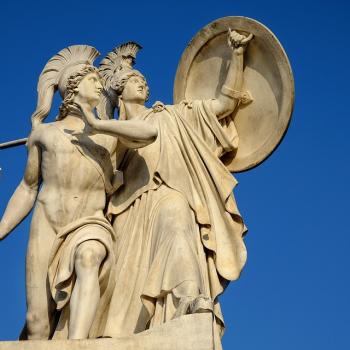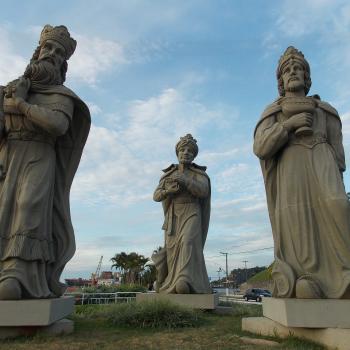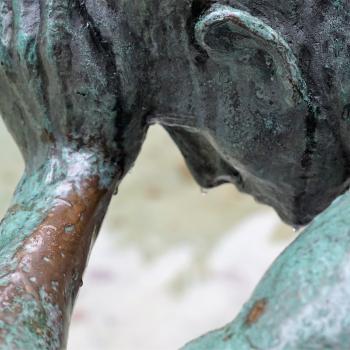If I were writing a Harry Potter novel, at this point I think I’d post a picture of Athanasius, waving and winking at you, just to encourage you. I realize that you may not have signed up for such an intense course of study when you decided to follow this series. I do hope and pray, as I write, that you find some of the ideas and experiences we discuss fruitful in your own life of prayer, your conversations with other believers, your engagement with the Church, and your “fellowship with the Father and with his Son, Jesus Christ.” I’m no John the Evangelist, but I really do write to help make your joy complete. I’m convinced that the Trinity is our destiny, the fullness of love, our experience of glory.
So, last week we were cruising along so nicely down the river of church history when we suddenly hit some rapids. Anatolios calls them “three major sources of destabilization that evoked a recasting and reinterpretation of the unity of Christian reflection.”
What is really surprising to me, as I look over this list, is how very contemporary these 4th-century questions and conversations are to us today. I think you’ll recognize them too.
1) “An emerging clarity on the radical difference between God and the world” – that is, people were becoming increasingly aware of creation as something very “other” than God. We might take that for granted, but early church theologians were just beginning to think this through. The Greeks (Aristotle, Plato) had taught that creation had always existed. Even Origen (184-253), one of our earliest church fathers, had suggested that creation was eternal, co-existent with God’s existence. (Just one of several things that got him pickled by the church authorities.) As the church developed, and as Christian thinkers struggled to articulate their beliefs, some of them started recognizing that this business of the eternal nature of creation was rather problematic.
How can God be uniquely transcendent if in fact nature itself has existed as long as he has? And for goodness’ sake, where did it come from if it has always existed? Aren’t we giving the creation an equal status to God?
The Church had drunk the Greek Kool-Aid.
The first word of resistance to this was based on the term “unbegotten,” meaning without beginning. God alone was “unbegotten,” therefore everything else had a beginning, and God is the source of all that is. If God is the source of all that is, then he is prior to everything else. If he is prior to everything else, then creation itself had a beginning, and creation is not God.
And we say, Amen. And duh.
But the Church experienced this as a boulder in the stream, because if God alone is unbegotten, and everything else had a beginning, then what exactly do we do with our bedrock conviction that Jesus is Lord, and that “through him all things were made,” and that he is God’s only-begotten Son? We worship Jesus, for heaven’s sake. (Happy pun.) Are we worshiping something from creation??
Anatolios writes this: “How then to reconcile the primacy of Christ, closely bound with his double relation to both God and creation, with this newly maximized sense of divine primacy—the radical difference between God and the world and God’s absolute priority and freedom from any kind of posteriority (or being caused)? … The question of the relation between Father and Son was closely bound to questions about the nature of divine transcendence and the relation between God and creation.”
Today we are bombarded with all kinds of new ways (most of which are not so new, really) to integrate our Christian spirituality with creation. At one end of the spectrum, there is simply a recollection that indeed, the world is created good and beautiful, and that God intends us to steward it to his glory, not plunder it for our own purposes. This leads us to a healthy and long overdue focus on ecologically wise practices and a need to repent for our often scandalously perverse abuse of the oceans and atmosphere, soils and forests. It has been a grace that the Church is waking up to its responsibilities to the world God has given us; we are supposed to be park rangers, not pirates.
At the other end of the spectrum, we find a strong panentheism, which is a way of seeing the world as “part” of God (yes, I’m talking about you, Matthew Fox, and your “creation spirituality”). This perspective receives the goodness of the world as an end in itself, and suggests that instead of an artist creating a living masterpiece, God has birthed something, which remains infused with and sustained by its embryonic status within the divinity.
My point here is not to belabor these differences, but to point out the ways that even now, more than fifteen centuries after these early church conversations, we are still running rapids over this particular boulder. This isn’t a back-then-there irrelevancy; it is a here-now question.
2) “Controversy and confusion as to the existence and soteriological significance of Jesus’ human soul” – that is, did Jesus have a human soul as well as a human body? Does it matter?
We remember some of the earlier heresies about the identity of Christ, one of which was the suggestion that Jesus was a full human being who had been “adopted,” or specially infused with, divine grace. Zapped with the Spirit, either at birth or at baptism, or perhaps on the cross. The Church rejected this outright. We’re not talking about an exceptionally gifted human being.
If he didn’t have a human soul, was he human at all? Could he be divine with a human soul? Maybe the divine part was where the soul oughta be.
And today? We go around and around about the issue of the human soul, from beginning to end—when it enters the fetus, if it enters into the definition of a human being, what happens to it after death, can it be destroyed, how it connects to God, do animals have one… Some religions teach that the soul is pre-existent; souls are eternal specks of God-life that enter into the created body. Is the soul what makes us humans instead of mere animals? Why? These questions pop up in conversations ranging from abortion to euthanasia. We wrestle with the meaning of that deep, most inner part of who we are and what it means to our relationships in the world and with each other. Did Jesus have a soul? Yes or no?
3) “A drive to systematization” – that is, as the Church grappled with its new status as an imperially-endorsed religion, it needed to clearly present its worldview and beliefs just as the many schools of philosophy around the world already had. In what ways is the Christian faith a “unified body of knowledge”? How does it all fit together? Does it fit together?? We see the parts, but do they make a coherent, compelling whole?
Well, this one is both easy and wearisome. The Christian systems we have generated ad nauseam over the last 2,000 years would make the most relentless scholar somnolent. Volumes of systems that cover bibliology, Christology, pneumatology, anthropology, soteriology, ecclesiology, eschatology, angelology, and endless other ologies galore—all layered one of top of the other until we weep for a breath of fresh air. Enough already!! Can’t we just believe in Jesus and be done with it?
Sure. If you want to live all by yourself, you and Jesus. Go ahead. But the minute you try to engage the world—at work, with neighbors, in conversations, reading the newspaper, praying, explaining your faith—you begin to engage systems, both yours (oh yes, you have one, you do) and those of others. And inevitably you will find at least two things. First, your system will certainly clash at some point with everyone else’s. Trust me on this. And second, you will certainly find that your system breaks down somewhere, somehow.
This is because not only do we not have all the answers, but we couldn’t understand them or integrate them even if we did. We live amidst mystery while we grope for clarity.
So while the Church has a center (refer back to the six characteristics of “flow” from last week), it also has a periphery. As tedious as they may sometimes seem, the systems we construct are supposed to help us name that center and live from it. Today, however, the Church spends an awful lot of time trying to make peripheral issues central, and ends up making central issues rather fuzzy and peripheral. Or so it seems to me.
The Church’s 4th-century compulsion to generate a systematic faith structure and worldview wasn’t just a perverse interest in tidying up peripheral issues, but a deep and momentous recognition that the six core “flow” issues, which had been believed and practiced since the beginning, led to a Trinitarian spirituality that needed to be put into words and formula that people could understand.
We have pooh-poohed that conversation, partly because it’s messy and partly because it’s challenging and partly because it simply doesn’t sell well in our simplistic “Jesus and me” evangelical world. I daresay that the shallowness of the Church today, and its utter confusion about what is vital to faith and what is secondary to it, is due in part to the neglect of centuries of conversation about the Christian mysteries. But that’s just my curmudgeonly opinion. Don’t mind me.
Or rather, please do—come back next week and we’ll divvy up our 4th-century theologians into two camps. Not good guys and bad guys, but maybe careful, cautious thinkers and big, reckless, shockingly audacious visionaries. Can you guess which ones prevailed
(Photo: noticelj, Flickr C.C.)
Note to Reader: This series on Trinitarian Spirituality explores the history and spirituality behind the shaping of the Nicene Creed using Khaled Anatolios’ Retrieving Nicaea: The Development and Meaning of Trinitarian Doctrine (Grand Rapids, MI: Baker Academic, 2011) as guide and inspiration. It’s best to begin at the beginning: An Introduction.












